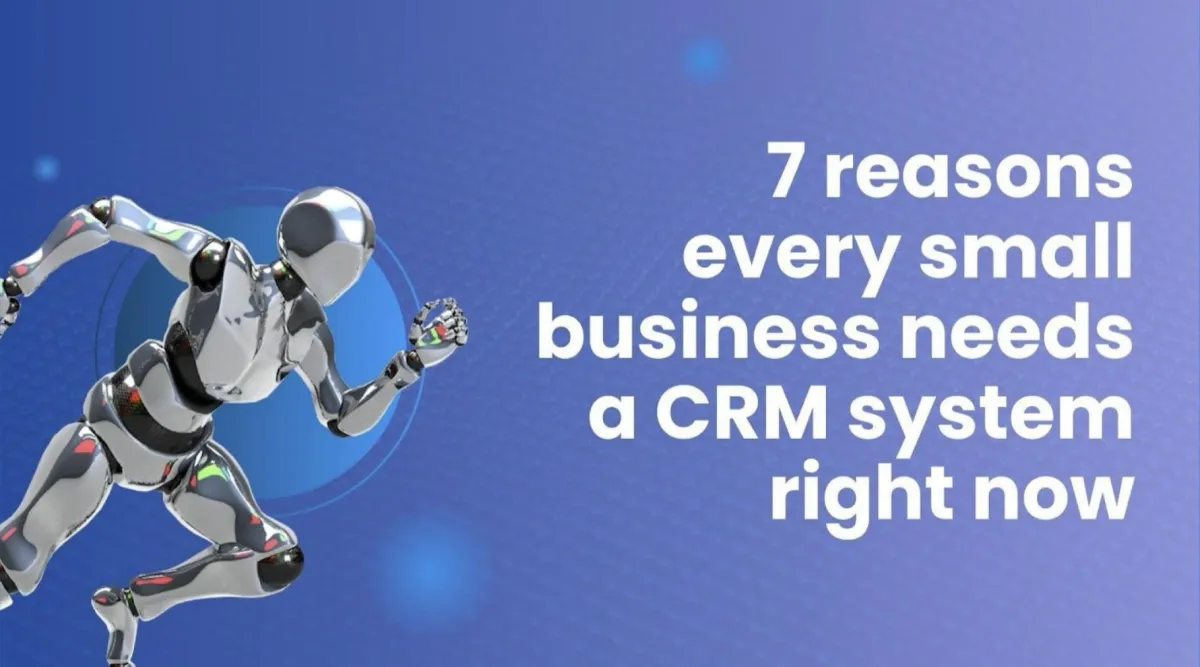Client Pro Blogs
Get Unlimited Leads With 'AI'
Download Our Free Ebook

7 Reasons Every Small Business Needs a CRM System Right Now
7 Reasons Every Small Business Needs a CRM System Right Now
Today's market is tough for small businesses. To stay ahead, they need tools that boost customer relations and make operations smoother. A CRM system is essential, not optional, for growth. With the right CRM, small business owners can better engage customers, streamline sales, and make smart decisions based on data. Here are seven top reasons to start using a CRM system immediately.
Key Takeaways
A CRM system enhances customer engagement and improves interaction tracking.
Implementing a CRM can lead to the quick addition of new customers through integration with daily-use apps.
Salesforce helps businesses adapt swiftly to customer needs, streamlining service delivery.
Effective use of a CRM leads to reduced manual tasks, allowing staff to focus on growth.
Cloud-based CRM solutions enable remote access and data backups, supporting flexible work environments.
Understanding the Role of CRM in Small Businesses
CRM systems are key in handling customer interactions and data. They do more than just gather info; they organize and automate conversations. This boosts customer happiness and engagement.
In 2022, the CRM market value hit over $58 billion. This shows how crucial CRM is for small businesses to succeed. It's expected to grow by 13.9% between 2023 and 2030.
CRM tools help increase sales and efficiency. They simplify sales activities, automate common tasks, and analyze sales outcomes. With all customer info in one place, staff can easily access vital details. This ensures customer interactions are personalized.
CRM makes keeping customers easier. Using customer data helps in promoting repeated business and loyalty. CRMs allow businesses to better understand their clients. They can craft marketing strategies that are more effective, improving engagement.
Improved Customer Engagement
Customer engagement is key for small business success. A strong customer relationship management (CRM) system improves it by bringing all customer info together. This means businesses can talk to customers in a personal way. Knowing your customers well builds stronger bonds with them.
Centralization of Customer Information
CRM systems put all customer data in one spot. This includes what they buy, like, and how to contact them. It makes it easy for businesses to see the full picture of a customer. This helps create loyalty and makes customers happy.
When team members can see everything about a customer quickly, they can meet needs better. They offer solutions that really fit the customer. This makes sure the brand stands out in the customer's mind.
Personalized Interactions
Personalizing experiences is crucial for good customer engagement. With CRM, businesses can look at customer data, divide it into groups, and learn what works best. This means customers get messages that really speak to them. Making customers feel special increases their satisfaction.
Also, reaching out through different paths like email or social media creates real connections. It helps build loyalty. Customers come to see your brand as one that cares about them.
Benefits of Enhanced Customer Engagement
Description
Increased Satisfaction
Tailored experiences lead to higher levels of customer happiness.
Loyalty Development
Personalized interactions foster a sense of belonging and loyalty.
Better Insights
Centralized data helps to understand customer preferences and behaviors.
Increased Engagement
Active communication encourages customers to interact with the brand.
Enhanced Outcomes
Overall performance improves as customer relationships strengthen.
Streamlined Sales Processes
CRM systems are great for making sales processes smoother. They handle routine tasks, so sales teams can focus on more important things. This means they spend less time on paperwork and more on selling. Being more strategic boosts sales numbers.
Automating Sales Tasks
Automating sales tasks saves time by managing repetitive duties. With products like Nutshell, sales reps get help through:
Auto-assigning leads to the appropriate reps based on rules.
Creating automated email sequences that start at certain sales points.
Sending out automated reminders and follow-ups for better communication.
Managing Sales Pipelines Effectively
Managing the sales pipeline well is key. It shows how leads move through the sales process. CRMs let businesses:
Watch lead progress to see where things can get better.
Make data-driven decisions from up-to-date sales info.
Improve teamwork, making it easy to share info and plan.
Benefit
Description
Increased Efficiency
Optimizing tasks helps teams focus on their main jobs and increase productivity.
Cost Reduction
Cutting down inefficiencies leads to less waste and lower costs.
Improved Customer Service
Fast and correct answers make customers happier.
Increased Sales
Focusing on key activities results in higher sales.
Enhanced Decision Making
Having up-to-date information helps make better business choices.
Enhanced Communication with Customers
Effective customer communication is key for small business success. This is where a CRM system comes in. It gives a single place for all customer talks. This means emails, chats, and calls are all in one spot. Teams can work better together and help customers more efficiently. Better communication leads to better customer service. This builds stronger relationships.
Centralized Platform for Interactions
A CRM platform helps keep valuable client talks in order. It acts as a central place, reducing mix-ups from scattered data. Surprisingly, 91% of businesses with more than 11 workers use CRM. However, 70% of CRM setups fall short because of weak customer communication. Fixing these gaps in the CRM lets businesses boost customer happiness and keep them coming back.
Making the CRM the single source of truth for team interactions
Streamlining communication within the platform
Integrating features like comments and mentions to engage team members
Implementing a modern rich text editor for diverse content types
Adding tools like CKEditor can really help. It brings things like Comments, Mentions, and Revision History. These features aid team work and improve customer talks. With a good CRM, a business can stand out. It makes big improvements all around.
Aspect
Before CRM
After CRM Implementation
Data Accessibility
Fragmented, difficult to access
Centralized and easy to retrieve
Response Time
Over 12 hours
Less than 1 hour
Customer Engagement
Low
High, with tailored interactions
Team Coordination
Limited, often misaligned
Improved through shared information
Data Organization and Management
Small businesses need efficient data management to reach their full potential. A CRM system helps by organizing customer data well. This lets firms easily use and understand their information to make smart decisions and grow.
Structured Data Access
Structured data lets employees find customer info fast and accurately. By organizing data well, mistakes common in manual entries are avoided. Things like dropdown picklists also make data more reliable by keeping it standard.
But, without a good system, businesses could face big problems, like high costs. IBM says bad data costs U.S. companies about $3.1 trillion annually. It's crucial to balance easy access to data with keeping it correct.
Data-Driven Decision Making
Strong data management supports decisions based on solid facts. This way, small companies can look at past trends and how customers act. Knowing this helps create more effective marketing and understand customers better.
Poor data could mean a company loses about 12% in revenue. But, with systems that automatically put in and check data, businesses cut down on errors. This saves time and helps focus on growth strategies that work best.
Boosting Customer Retention Rates
Keeping customers is key for any small business. It's cheaper to keep an existing customer than to find a new one. Businesses can use CRM systems to keep customers happy. These systems track how customers interact with the business. They help companies focus on keeping their best customers.
Nurturing Valuable Customers
CRM automation tools, boost profits by keeping customers coming back. These tools let brands send marketing that speaks to each customer. They make it easier for sales teams to follow up and know customers better. This all leads to more customers sticking around.
CRM systems also offer great customer support tools. They make it easy to help customers quickly. With live chat and self-service, businesses can solve problems fast. Getting feedback helps businesses understand what customers like and don't like.
Loyalty programs help keep customers too. They give rewards that make customers want to come back.
Using CRM analytics helps businesses stay ahead. They can see what customers like and how to keep them happy. Measuring how well loyalty programs work helps improve them. Businesses can make sure their customers always have a great experience. This makes customers loyal for a long time.
Targeted Marketing Campaigns
In today's competitive world, small businesses need smart marketing to succeed. Targeted marketing, by dividing customers into groups, changes the game. Companies can customize their messages for each group's unique needs. This approach improves customer interest, boosts sales, and enhances happiness.
Segmentation of Customer Base
Businesses use customer segmentation to spot different groups using demographics, behaviors, and buying history. CRM tools help gather this data, allowing for precise marketing. Such strategies have led to impressive outcomes:
Open rates for personalized email campaigns increased by 25% compared to generic email blasts.
Conversion rates jumped by 35% for an e-commerce retailer utilizing personalized emails.
Customers spent 20% more per transaction after receiving personalized offers.
Omnichannel marketing led to a 40% increase in summer holiday bookings for a travel company.
Click-through rates from emails and social media ads improved by 30% during an omnichannel campaign.
Customer satisfaction scores related to the booking experience increased by 50% due to consistent messaging.
The omnichannel campaign resulted in a 25% revenue boost for the travel company.
Using CRM for real-time insights helps marketers perfect their approach across industries. Most customers, about 71%, like it when brands personalize. Also, companies focused on data do better in winning and keeping customers, which helps them grow.
Statistic
Impact Percentage
Increase in open rates for personalized email campaigns
25%
Jump in conversion rates for e-commerce with personalization
35%
Increase in spending per transaction after personalized offers
20%
Increase in summer holiday bookings through omnichannel marketing
40%
Improvement in click-through rates during omnichannel campaign
30%
Increase in customer satisfaction scoring with consistent messaging
50%
Revenue boost from omnichannel campaign
25%
Efficient Customer Support
Today, having quick and effective customer support is vital. A customer relationship management (CRM) system is critical in streamlining support. It helps businesses follow customer issues closely. This makes solving problems faster and boosts customer satisfaction.
Tracking Customer Issues
CRM systems gather all customer issues in one place. This makes it easier for teams to handle them. Thanks to omnichannel support and automated workflows, teams can spot and fix problems quickly. This not only solves issues quickly but also makes customers happier.
Monitoring Response Times
CRMs help track how fast teams respond and solve customer issues. Analyzing these details helps find and fix delays. This ensures customers get help quickly, which keeps them loyal.
CRM Feature
Benefits
Omnichannel Support
Seamless communication across multiple platforms
Automated Workflows
Reduction in manual tasks leading to faster issue resolution
360-Degree Customer View
Comprehensive understanding of customer interactions
Real-Time Analytics
Ability to monitor performance metrics immediately
Proactive Assistance
Anticipating customer needs before they arise
Using a good CRM system lets businesses fix customer problems better. This improves satisfaction and keeps relationships strong. When businesses focus on excellent service with CRM, they lead the market.
Scalability for Future Growth
Small businesses aim for growth, facing new customer needs and complex challenges. A scalable CRM system helps businesses adapt and grow. It changes to meet your company's evolving needs. Using a scalable CRM system, businesses build a solid base for future success.
Adapting to Changing Business Needs
Businesses need flexible solutions for changing markets and customer expectations. Scalable CRM systems are great for this. They offer features that grow with your business. These benefits are key:
Efficient Workload Management: Scalable CRMs adjust for more work and user demands.
Modular Design: Users can add or drop modules as needed, fitting changing workflows.
Cloud-based Architecture: Resources scale based on demand, helping businesses use what they need, when they need it.
Customization: Custom solutions boost user satisfaction and efficiency.
Reduced Upgrade Costs: Fewer upgrades save money and keep investment value high, improving ROI.
Remote Work Compatibility
Today's work world is changing, and remote work fits right in. Small businesses see how important this is. Cloud-based CRM systems help keep teams together and working well, no matter where they are. This kind of tech makes working together easy and keeps things moving smoothly.
Cloud-Based CRM Accessibility
A CRM system for remote work means you can get to important customer info and tools from anywhere. You just need the internet. This is huge for keeping things running smoothly, especially for teams in different places. Using cloud solutions helps tackle the usual remote work problems, like messed up communication and data issues.
At the 2021 Grow with Inbound conference, Avison Young's story with HubSpot CRM was shared. It showed how cloud-based systems keep things going, even from afar. They beat problems like missing deadlines by making sure everyone knew what was needed. CRM software made it easy to keep everyone on the same page and work together better. It's all about trust among team members who are not in the same place.
CRM systems are key for remote teams to connect without issues. Azamba Consulting Group, with most folks working remotely even before COVID-19, is a great example. They showed how CRMs can make work easier by automating and organizing better. Here's a table that shows why cloud-based CRMs are better for remote work compared to traditional ones:
Feature
Cloud-Based CRM
Traditional CRM
Accessibility
Available anywhere with internet
Limited access, typically on-site
Collaboration
Real-time updates and sharing
Delayed updates, potential for confusion
Data Security
Enhanced security measures
Potential vulnerabilities
Task Management
Automated follow-ups and assignments
Manual tracking
Cost Efficiency
Higher return on investment
Long-term expenses for infrastructure
To wrap up, using cloud-based CRM solutions is a game changer for businesses in the remote work world. It's all about being adaptable to keep customer relationships strong and boost productivity.
Gaining a Competitive Advantage
In today's small business landscape, staying ahead is key for growth. A smart approach can make your company stand out. One top strategy is using a solid CRM system to offer tailored customer service.
Personalized Service as a Differentiator
Modern customers want experiences made just for them. With CRM, you can automate messages based on their details. This means customer service that truly matches what they like. It doesn't just meet their needs; it makes interactions unforgettable and builds loyalty.
By leveraging CRM analytics, small businesses get really good at meeting customer needs empathetically and accurately. This boosts engagement and increases sales. In essence, focusing on personalized customer service sets businesses apart. It gives them a real edge in their market.
The Importance of CRM System for Small Business
An effective CRM system boosts small businesses' operations. It’s crucial to see the value of weaving CRM into your business fabric. By doing so, businesses tap into customer data to improve engagement and handle information well.
Understanding CRM Integration
CRM integration escalates small business performance. Facts show 67% of businesses using CRM see better results. A notable 82% enjoy higher customer loyalty, proving CRM's role in keeping clients. Plus, firms report a 48% revenue boost and 45% more sales productivity.
A CRM hike in lead conversions by 30%. It can also lift customer happiness by about 25%. These systems up staff efficiency by 23% and cut sales and marketing costs by 25%.
CRM integration saves up to 17% in project management time. Real-time reporting from CRM aids swift, informed choices. A central customer data hub keeps facts straight, cutting down on errors.
Using comprehensive CRM systems like those from Nimble.com, Zoho CRM, or Pipedrive lets small firms polish customer profiles and services. It streamlines marketing and sales, boosting departmental cooperation and efficiency.
Statistic
Impact
67%
Performance improvements post-CRM implementation
82%
Increase in customer retention rates
48%
Revenue increase
45%
Sales productivity increase
30%
Average improvement in lead conversion rates
25%
Enhancement in customer satisfaction rates
17%
Time saved in project management
CRM’s worth is undeniable. It lets small businesses nurture lasting customer ties and smoothen operations. This is vital for growth and competitiveness today.
Choosing the Right CRM Solution
It's crucial for small businesses to pick the right CRM software to better operations and customer relations. It involves understanding CRM features and looking at costs.
Features That Matter
Key features are vital when choosing the best CRM for small businesses. Here are important features to look at:
Sales and marketing automation: This boosts efficiency and productivity.
Contact management: Keeps customer info in one place for better talks.
Reporting capabilities: Offers insights to make informed decisions.
Integrations: Works well with other tools to improve performance.
Customer support ticketing: Makes solving customer issues quicker, improving satisfaction.
Evaluating Costs
Knowing the costs tied to CRM systems matters too. While pricier options have more tools and customization, decide what you really need. CRM features comparison can point out big differences. Also, think about what you'll gain back from your investment. Advice from peers and online reviews can also help.
Feature
Basic CRM
Advanced CRM
Sales Automation
Limited
Comprehensive
Integration Options
Minimal
Extensive
Customization
Low
High
Reporting Tools
Basic
Advanced Analytics
Mobile App
No
Yes
Small businesses often start with simple CRM solutions. As they grow, they may switch to more advanced systems. Looking at features and costs together helps find a CRM that fits their needs and processes.
ClientPro AI: The All-in-One CRM for Small Businesses
When selecting the right CRM, small businesses need a solution that balances robust features with ease of use. ClientPro AI delivers exactly that—an all-in-one platform designed to help small businesses streamline operations, enhance customer relationships, and boost growth. With its AI-driven insights and intuitive interface, it’s an ideal choice for businesses looking to scale efficiently.
Benefits of ClientPro AI:
Centralized Customer Management: Easily access and organize customer data to improve engagement and loyalty.
Integrated Marketing Tools: Automate campaigns, track performance, and optimize strategies for better results.
AI-Driven Insights: Leverage predictive analytics to anticipate customer needs and make data-informed decisions.
Ease of Use: User-friendly design ensures quick adoption without the need for extensive training.
Scalability: Adapts to your business growth with modular features and seamless integrations.
Discover how ClientPro AI can revolutionize your small business operations.
Implementation Challenges to Consider
Implementing a CRM system is a big step for any business. It comes with several CRM implementation challenges that need addressing for success. Key to this are good employee training and setting realistic timelines.
Employee Training Needs
Effective training for CRM system use is vital. About 50% of CRM projects fail because users don't get enough training. Investing in educating employees on CRM features is critical. This means providing a mix of training, like hands-on workshops and online tutorials. Good training boosts confidence and engagement, making the organization more efficient.
Realistic Timelines for Success
It's also crucial to set realistic timelines for CRM setup. Many businesses don't allot enough time for integration, which leads to problems. A good timeline includes setup, data transfer, training, and feedback phases. Planning well prevents rushing and manages everyone's expectations.
Challenge
Impact
Solution
Inadequate Training
50% project failure rate
Comprehensive employee training programs
Unrealistic Timelines
Rushed implementation leading to poor adoption
Detailed project timelines with flexible adjustments
Resistance to Change
Decreased employee engagement
Involve employees in the process and address concerns
Data Migration Issues
Potential data loss and inaccuracies
Careful data mapping and validation procedures
Overcoming these CRM implementation challenges increases the chance for a smooth changeover. It also helps employees use CRM effectively in their work.
Utilizing CRM for Better Insights
Using a CRM system improves how businesses understand customer behavior. It helps in seeing how customers interact with the brand. With these insights, companies can make marketing efforts that connect with people better.
Understanding Customer Behavior
Tracking every customer interaction, from emails to social media talks, helps businesses learn what customers like. CRM lets companies keep all customer information in one place. This makes messages more personal, boosting customer happiness and loyalty.
Enhancing Marketing Effectiveness
CRM systems let marketing and sales teams create efficient campaigns for specific groups. They can look at customer data to find important success indicators. This helps in making informed decisions that improve campaign results, engagement, and sales.
Benefit
Impact
Increased Customer Retention
27% improvement
Sales Productivity Boost
14.5% increase with automation
Improved Customer Experience
Tailored business practices
Cost-Efficient Campaigns
Targeted promotions enhance ROI
Real-Time Analytics
Timely insights for better decisions
Case Studies: Successful CRM Implementation
Looking into real-world cases, we see big wins for small businesses from CRM systems. Different companies have shown us their CRM journey, with massive benefits. They've improved their customer management and business results greatly.
Examples of Small Businesses Thriving with CRM
Hownd got an 80% cut in CRM costs in two weeks, showing quick financial gains from smart use.
Casio saw a 26% rise in new customer sales after getting a new CRM, proving the boost in income it can bring.
Users of Salesforce CRM cut their sales cycle from 60-90 days to just 30, making things faster and more efficient.
IKEA uses its CRM to run the IKEA Family loyalty program. This offers special deals and rewards, increasing customer interest.
Ceros enjoyed a 180% jump in deals from meetings after starting HubSpot's Sales Hub. This shows CRM's power in lifting sales.
With Freshworks CRM, CliqStudios sped up their sales cycles by 35%, as their sales team quickly adapted to it.
Grammarly had an 80% rise in plan upgrades with Salesforce CRM, showing how CRMs boost customer upgrades.
A UK study with 346 hotel managers found only 30.7% of them saw better sales and customer service from CRMs. This highlights the importance of using CRM thoughtfully.
Close helped a company multiply its average revenue per user fourfold after CRM use, demonstrating its strategic impact.
These stories show the strong impact of CRM on small businesses. By adopting CRM wisely and using it well, firms can greatly boost their customer relations and overall business success.
Conclusion
In today's fast-paced world, using a CRM system is crucial for small businesses that want to grow and build strong connections with customers. A CRM helps improve how you engage with customers and makes sales processes more efficient. It also improves communication by keeping all customer info in one place, helping businesses understand their customers better and spot new chances for growth.
Thanks to recent tech advancements, CRM systems are more accessible than ever. This lets small businesses hold their own in a changing market. CRMs do more than just store data; they make customers happier with personalized services. This leads to deeper loyalty and more repeat business. By using a CRM, businesses can work more smoothly and strengthen their customer relationships.
To wrap up, adding a CRM system is a smart choice for small businesses aiming for long-term success. As customer interaction changes, having a strong CRM base is key to growing and staying competitive. This move not only makes businesses work better but also sets them up for future success.
FAQ
What is a CRM system for small business?
A CRM system for small business is a tool that helps manage customer relationships. It organizes sales, communications, and data to improve customer satisfaction and engagement.
How can a CRM system improve customer engagement?
A CRM system boosts customer engagement by keeping all customer info in one place. This leads to personalized service and a deeper understanding of what customers need. Happy customers stay loyal and have a better experience.
What are the benefits of streamlining sales processes with a CRM?
Using a CRM to streamline sales makes repetitive tasks like tracking leads easier. Sales teams work smarter, not harder. This ensures every potential sale gets the attention it needs.
Why is effective communication important in a small business?
Good communication is key because it boosts customer service. Everyone on the team knows the customer's history. This means they can provide top-notch support based on what they know.
How does a CRM help with data organization?
A CRM organizes customer info well, making it easy to understand. This helps with decision-making and improving marketing strategies that really hit the mark.
What role does customer retention play in using a CRM?
Keeping customers is cheaper than finding new ones. A CRM tracks how engaged customers are. This helps businesses keep in touch and value their ongoing support.
How can small businesses use CRM for targeted marketing campaigns?
Small businesses can use CRM to pinpoint target markets using customer data. This helps in making marketing more effective. It leads to better responses and more sales.
What features should I look for in the best CRM system for small business?
Look for a CRM with automation, good data management, and tools for customer support. Make sure it can grow with your business and fits your budget.
What challenges might I face when implementing a CRM system?
Implementing a CRM might mean training staff and setting up realistic timelines. It's important to get everyone up to speed to use the system well.
How can I leverage CRM to gain better insights into customer behavior?
Use CRM to analyze how customers interact and what they prefer. This knowledge helps tailor marketing to meet their needs and boost engagement.
Let’s get you growing. Without the growing pains.
Let’s get you growing. Without the growing pains.
Contact Us
Easily Integrates With Leading Apps





About Client Pro
Culture
Compare Client Pro
Customer stories
Products
Features
All features
Appointments
Automation
CRM
Ecommerce & payments
Email marketing
Integrations
Landing pages & forms
Lead management
Reporting & analytics
Sales pipeline
Text marketing
Resources
Events
What is a CRM?
Lifecycle Automation
LCA Assessment
Free email templates
Subject Line Generator
How-to guides
Blog
Partners
Find a partner!
Apps & integrations
Help & Support
New customer resources
Customer Support
Help center!
Training Academy
Client Pro Marketplace
Play & template library!
Culture
Compare ClientPro
Customer stories
Contact us
Features
All features
Appointments
Automation
CRM
Email marketing
Text marketing
Sales Pipeline
Integrations
Payments & Invoicing
Websties & Landing pages
Lead management
Reporting & analytics
Products
Basic
Pro
AI Agent
Resources
Events
Automation
Free email templates
How-to guides
Blog
Help & Support
Customer Support
Help center
Client Pro Training Academy
Marketplace
Data migration
Coaching & guarantee
Product updates
Partners
Become a partner
Partner portal
Apps & integrations



